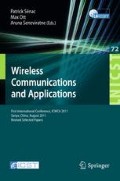Abstract
In order to fully utilize the scarce spectrum resources, with the development of cognitive radio technologies, dynamic spectrum access becomes a promising approach to increase the efficiency of spectrum usage. In this paper, we consider the spectrum access in wireless networks with multiple selfish legacy spectrum holders and unlicensed users. In order to improve transmission quality for different cognitive users with various services in the cognitive network, a novel dynamic spectrum access technology based on multi-features model clustering is presented. After the model of the sub-channels extracted, these channels are clustered into different spectrum pools using multi-objective clustering algorithm. These channels in white pools are priority to be accessed for cognitive users. Analysis and simulation results show that the access efficiency of channels can be improved for cognitive users.
Access this chapter
Tax calculation will be finalised at checkout
Purchases are for personal use only
Preview
Unable to display preview. Download preview PDF.
References
Federal Communications Commission, Notice of proposed rule making and order. ET Docket No 03-222. FCC, USA (2003)
Cabric, D., Mishra, S., Willkomm, D., Brodersen, R., Wolisz, A.: A cognitive radio approach for usage of virtual unlicensed spectrum. IST Mobile Summit (2005)
Mitola, J.: Cognitive radio for flexible mobile multimedia communication. Mobile Multimedia Communication 11(1), 3–10 (1999)
Weiss, T., Jondral, F.: Spectrum Pooling - An Innovative Strategy for the Enhancement of Spectrum Efficiency. IEEE Communications Magazine 42(3), 8–14 (2004)
Friedrich, K.: Cognitive Radio – A Necessity for Spectrum Pooling. Universität Karlsruhe Communications Engineering Lab (2006)
Seidel, S.: IEEE 802 Tutorial Cognitive Radio (2010), http://www.ieee80-2.org/802tutorial/-july05/IEEE/20802/20CR/20Tutorial/207-18-05/20se-idel/20input.pdf
Luwen, Z., Zhimin, M., Zhijie, Z., Hao, Z.: Dynamic spectrum access technical base on K-means clustering. Signal Processing vod 25(12), 1825–1829 (2009)
Beibei, W., Ji, Z., et al.: Primary-prioritized Markov approach for dynamic spectrum allocation. IEEE Transactions on Wireless Communications 8, 1854–1865 (2009)
Akyildiz, F., Won-Yeol, L., Mehmet, C., Shantidev, M.: Next generation /Dynamic spectrum access/Cognitive radio wireless networks: A survey. Computer Networks Journal 50, 2127–2159 (2006)
Author information
Authors and Affiliations
Editor information
Editors and Affiliations
Rights and permissions
Copyright information
© 2012 ICST Institute for Computer Science, Social Informatics and Telecommunications Engineering
About this paper
Cite this paper
Li, J., Tan, Z., Chen, H., Tao, C. (2012). A New Dynamic Spectrum Access Technology Based on the Multi-features Model Clustering in the Cognitive Network. In: Sénac, P., Ott, M., Seneviratne, A. (eds) Wireless Communications and Applications. ICWCA 2011. Lecture Notes of the Institute for Computer Sciences, Social Informatics and Telecommunications Engineering, vol 72. Springer, Berlin, Heidelberg. https://doi.org/10.1007/978-3-642-29157-9_29
Download citation
DOI: https://doi.org/10.1007/978-3-642-29157-9_29
Publisher Name: Springer, Berlin, Heidelberg
Print ISBN: 978-3-642-29156-2
Online ISBN: 978-3-642-29157-9
eBook Packages: Computer ScienceComputer Science (R0)

